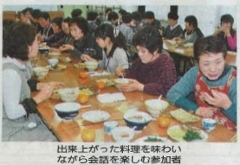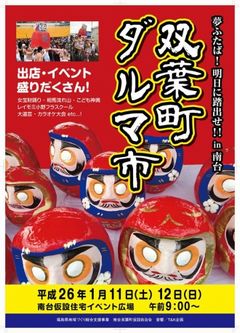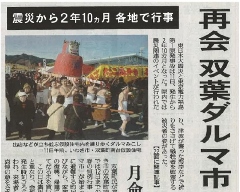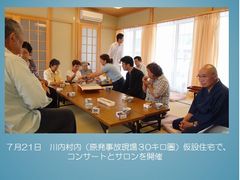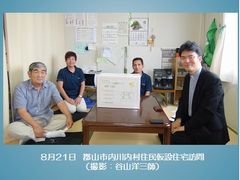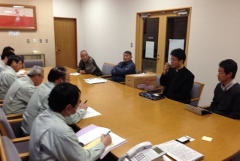TouhokuHELP’s support for Fukushima: Direct connection
TouhokuHELP’s relief activities are currently being deployed focusing on Fukushima.
We absolutely cannot ignore the damage to the coast brought about by the tsunami. However, we believe that for all aid from now on it is necessary to create coordinated connections with the area struck by the tsunami starting with Fukushima then the surrounding coastline.
The reason we must first focus on Fukushima is because there are difficulties with aid in that region.
The other day one of the leaders of Okuma town passed away. He was a very kind person who told me in depth about Okuma town. When the family was contacted to express condolence and inquire about the last moment of his life, they said that it was a “sudden death”. At the end of last year he was still quite healthy; however, he began to cough violently and was admitted to the hospital where he breathed his last breath. The cause of death is yet unclear. When the Okuma town Social welfare chairman was informed he then responded “my cousin just recently also suffered a sudden death as well”.
Hearing this reminded me of many things I heard from a pastor in Fukushima. To begin with, the number of people who are recognized as having a death which is related to the disaster have already far surpassed the number who died directly to disaster. This is believed to be unrelated to “radioactivity”. This may be true. However, this may not be true. If not being true is the case, the same thing may happen to me tomorrow...
Those who were forced to evacuate from the irradiated region of Fukushima there still live with this worry. There are also few hundred thousand people living in a wider range who received a lower dose of radiation also living with the same unease.
There are also churches there. And they are seeking and praying wanting to stand alongside those who have unease in their soul.
TouhokuHELP would like to reach out to such churches.
The organization of TouhokuHELP’s aid for Fukushima of this past six months is described below.
(1) Principles for Aid
TouhokuHELP has established principles for how we provide aid. These principles are referred to as our “Direct Connection and Close Contact” principles. The church is closely related to the region. The church is also connected to the rest of the world. This produces “That which the Church can do”. We intend to continue this feature of how we conduct our aid according to these principles. This is because these principles have been established to take advantage of the strengths of the church by collecting information from aid in the tsunami disaster area.
(2) Concrete Aid 1: Short Term Shelter
Short term shelters are being developed with participation in the “Fukushima HOPE Project” through operation of the “Family Temporary Shelters” using measurement stations.
The goal of these shelters is for the spiritual care of families. By reaching them through support and standing alongside to them we get a chance to hear the groaning of those whose hearts are plagued with anxiety. By talking it out they are able to lighten the grief and pain swirling inside them. Also beyond that they can receive the good will of people from around the country and around the globe. It is anticipated that in doing so a positive support for the soul (the synthesis of mind and body) can be developed.
We have some theories regarding whether or not rest is effective when dealing with damage to the body caused by radiation. On this topic we do not know very well (we are grateful to “Masahiko Fuse, an Associate Professor at Fukushima National College of Technology” for providing us with valuable information about this matter).
However, we believe that through recuperation, good relations are built with parents and children who are struggling with stress and that encouraging them while escorting them is an effective way of caring for their spirits. We are currently being permitted to provide escort to 50 households. Through this escort, we are able to have many joint hub facilities. With that encouragement we continue to provide support. (The article “The Challenges of the Nuclear Power Plant and US” which records the things learned from those experiences appeared in the December 25th edition of newspaper “The Christ Weekly.”
(3) Concrete Aid 2: Consultation Visits
Consultation visits are a part of our aid wherein the leased housing/ temporary housing neighborhood council chairman together with government representatives meet with those in need to hear their needs and consider how to support them.
So far we have met with the government representatives of Kawauchi City, Namie City, Nahara City, Futaba City, Tamura City Miyakoji, and Okuma, visited temporary housing facilities in Fukushima City, Nihonmatsu City, Kooriyama City, Iwaki City, Minamisouma City, and have been allowed to hold meetings regarding measurement stations in the “rental temporary housing” neighborhoods in Futaba City and around Iwaki City.
While doing this we have the opportunity to hear profound stories from the refugees. Neighborhood council chairman Saito who is refuging in Iwaki City has collected and recorded the contents of those stories. Since we have received permission to do so, we would like to introduce some of these stories. We would be honored if you would read a few. (Document 1)
Momoko Fukuoka, a relief worker for Fukushima also sent us a letter. (Document 2).
There are still needs there which have not been met. However, in the midst of their need, everyone is trying to survive. This is because they still hold their honor. We are implementing a new plan together with those who are involved so we can focus on that self-respect.
I like to introduce some recent cases ordered from the document mentioned above.
a. December 10th 2013 “Futaba Sincerity meeting” Aid (Iwaki City)
This is as written in the newspaper article from document three. TouhokuHELP dispatched one of their staff, Ms. Yoko Kamo (a member of Japan Alliance Christ Church Nakoso Gospel Christ Church), for this special event.
b. January 11th and 12th 2014 “Futaba Daruma City” Aid (Iwaki City)
“Daruma City” held a meeting in Iwaki City as the sponsoring company of Futaba City. This special event was planned by the city so that we would have as much chance as possible to gather together the refugees who have been living all over Fukushima City, Koriyama City, Shirakawa City and Iwaki City. It seems that because of the budget, courtesy busses could not be sufficiently prepared. When visiting the temporary housing we were able to hear how the neighborhood council chairman was struggling with this problem.
As such, in consultation with members the Futaba city council who had already allowed us to hold a meeting there once before, one courtesy bus was sent so that Rev. Yoshinobu Akashi and Yutaka Akiyama could be dispatched. The event became a great success. We were honored to receive a letter of gratitude from the Mayor of Futaba. We are pleased that this has become the cornerstone of new support there. (Documents 4 and 5)
c. January 18 2014 “Presentation Ceremony”
We presented rice, miso, and soy sauce etc. to refugees living in the temporary housing in Namie City. We were able to provide this aid since the aid was decided on in December of last year but was suddenly aborted in October.
There still remain deep and strong pains from both sides from when the aid was aborted, those who canceled the aid, and those whose aid was aborted. We think that there were many circumstances though. There are probably those voicing doubts about the necessity of aid. However, it is important to relieve the uneasy feeling of “I’ve been abandoned...” It felt like we could see that unease lifting from the facial expressions of those who gathered when we visited the temporary housing on January 18th.
We are very grateful to have received just the right amount in donations to cover the part that had been canceled and to have been allowed to use it for that purpose. That is because as one from “the supporting side” we want to preserve the dignity of “those being supported”.
Upon this, the chairman of the temporary housing neighborhood council prepared for us an interview with the newspaper companies and performed the presentation ceremony. This was performed on January 18th. The attitude of wishing to repay feelings of obligation, this is proof of their human dignity, and knowing this we were greatly encouraged.
Also, at the end of that meeting the chairman gave an important report. He stated that arrangements were made to organize a “Neighborhood Council Alliance” made up of all the temporary housing areas in Fukushima City. When we first met we discussed how necessary this would be. We held this great joy with us and returned to Sendai.
d. ADR Collective
This is to make the things discussed in our meetings an opportunity to make a decision. We believe this is a joyous thing that we can show the work of God close up. We also believe that it would even more be joyous if the decision would create such a collective.
Our consultation visits began due to the collaborative work of both clinical chaplains and multi-theistic individuals. Only through working cooperatively will we be able to gain the trust. As of now, providing support for Fukushima is an incredibly complicated and delicate task, so having the government’s trust and participation is incredibly valuable.
These consultation trip activities began in the summer of 2013. Mr. Watanabe of The United Church of Christ in Japan Suma Church has been focusing his support on songs and spirit, he holds a “tea meeting” for the temporary housing for a group also comprised of Muslims, Buddhists, and counselors.
After that it was developed to include everyone in Kawauchi city. We received sewing machines from all over the country as donations which we gave to them as a present. This has been found useful at the Temporary housing meeting room. Also, we had the opportunity to pay a consultation visit with Yozo Taniyama, a teacher of Jodo Shishuu Otani (See picture on Document 6,7). Under these circumstances we met many new people.
There were also some cases when the neighborhood council chairman would ask to participate in our conference. We received them with a huge welcome and had them participate in the conference of relief-worker held in Fukushima called “Advocacy Meetings”. There, the neighborhood council chairman told us how they had decided to gather some of the isolated towns and confronted TEPCO using ADR (Alternative Dispute Resolution). In truth, they honored us by making their first declaration of this decision in our meeting.
45,000 of the 200,000 people displaced as a result of the nuclear power plant explosion, had their “emotional compensation of 100,000 per month per person” canceled. However, it is still unclear if those people will be able to return home. More than that however, many are still deeply suspicious of whether they will be able to return to their former work. For the sake of those peoples’ lives from now, the chairman hardened his determination to face TEPCO. The chairman has said that something must be done for the sake of “the disappearing hometown”.
Also, this year when I visited him for the New Year’s greetings, the preparations were in order, and the chairman came up with one proposition for us. He wished to create solidarity between those who wanted to sue ADR as Kawauchi City had done.
We are an organization that “supports the supporters”. It is seen as a great honor to support the chairman who is struggling for the sake of “the elderly who were left behind” and what he sees as the “disappearing hometown”.
On January ninth of this year I was able to hold a meeting with Muslim clinical pastor Nasser Nagano, along with the administrators of the support group, temporary housing residents, and government representatives for Tamura City Miyakoji district. As such, when we were presenting the sewing machines we told the residents of Kawauchi City how it was requested of them to build solidarity through ADR. In truth, many of the people in Miyakoji are facing the same problems as Kawauchi. New solidarity was thus able to grow quickly in that place.
The above is a summary of our “Fukushima Aid”. Its features can be summarized in the following three points.
1.Support that is born and developed on site.
2. Support for “supporters” such as mothers, neighborhood chairmen, and government representatives
3.Development within the bounds of the request and thoroughly responding to the needs of evacuees.
This work has been born of the great support and prayers from everyone. We will end here, but wish to express our gratitude.
(January 22nd, 2014 written by Naoya Kawakami)

